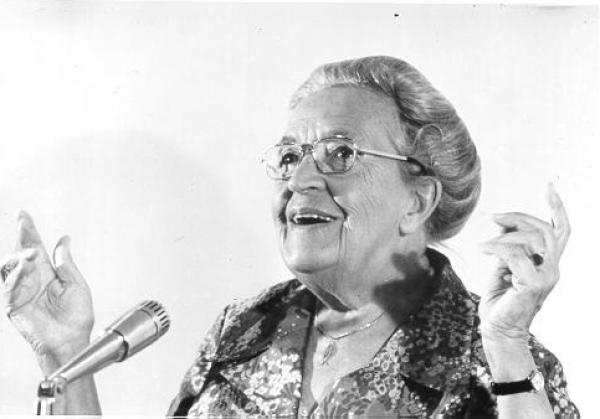
Eternity through the Rearview Mirror tells the mesmerizing tale of Corrie ten Boom. One would have never guessed that beneath her soft-spoken gentle exterior beat the heart of a warrior. She would have never guessed that her life’s work of thirty years—the one that put her in the history books—would not begin until she was sixty years old.
Corrie had many lessons to teach. Her enthralling life was an extraordinary one and she taught us, most notably, how to overcome obstacles that initially appear to be unconquerable.
Corrie’s Early Years
Corrie grew up in the Netherlands. Her grandfather and father were watchmakers and she had the distinction of being the first female watchmaker in all of her country. They were a devout Christian family, praying every night for their Jewish brethren. (That tradition is still being observed at the Corrie ten Boom Museum in Haarlem.) Corrie and her family were always helping those less fortunate in their community and were happy and content with their lives. I can safely venture a guess that she had no idea what was ahead of her.
When the Nazi’s overtook the Netherlands in World War II, Corrie and her family didn’t hesitate for a moment to do what needed to be done. They used their resources and contacts to be part of an underground movement to help Jews escape the clutches of the Gestapo. Their home became a refuge center.
There were so many suspicious eyes; it was only a matter of time before someone informed on their activities. On February 28, 1944, four years into the occupation, the Gestapo burst into their home and arrested everyone they could find—some thirty people by the end of the day.[1] As hard as the Gestapo searched, however, they never found the secret room. Oh, they knew it was there, somewhere. She heard one officer say to the others: If there’s a secret room here, the devil himself built it. It was there, all right, but the devil surely didn’t build it. That hiding place, the one in which huddled those six terror-stricken fugitives and resistance workers was so small all they could do was stand. They didn’t dare move for fear of making a noise and being discovered. They didn’t dare move until came the all clear signal. For forty-seven hours, they didn’t dare move.
Those six made it to freedom; Corrie, her sister Betsie, and other family members weren’t so lucky. They were taken to prison for aiding and abetting Jewish refugees.
Corrie at Ravensbrück
After 4 months in prison, Corrie and Betsie were taken to Ravensbrück, the women’s death camp north of Berlin. The horrors of Ravensbrück and other concentration camps have been well documented. Hundreds of barracks, each built for 400, housed 1200 women each. Under the most deprived and inhumane treatment, Corrie continued to help others unconditionally, and in the process helped herself. What and how she endured gives us a picture of faith enduring: how perseverance leads to hope, and hope leads to a certainty that God delivers what he promised, an eternity in heaven.
God turned this horror into an opportunity
Through God’s will, and much to the bafflement of the SS officers, Corrie was released from Ravensbrück six months later. God freed her for a purpose—to take the message of forgiveness to people in sixty countries. She knew that at the heart of healing is forgiveness. The inability to forgive, however, is a strange thing, built upon a foundation of stubbornness and wounded pride. One has every reason, should one so choose, to be nothing more than an interesting invalid, full of self-pity and self-righteousness. As she said about her fellow prisoners: Those who were able to forgive their former enemies were able also to return to the outside world and rebuild their lives, no matter what the physical scars. Those who nursed their bitterness remained invalids—prisoners. It was as simple and as horrible as that.[2]
Corrie, knowing that the world’s troubles would be infinitely less if people would forgive one another, sprang into action; indeed, her story is synonymous with forgiveness. She learned its power and spent the last thirty years of her life empowering others with encouragement, urging, and reassurance that forgiveness was the key to peace, unity, and harmony. I think she would have been admired Eleanor Roosevelt for her stance: It isn’t enough to talk about peace. One must believe in it. And it isn’t enough to believe in it. One must work at it.
To hear or read an overview of Corrie’s life, pick up a copy of Eternity through the Rearview Mirror. For greater detail, read her book or see it on video: The Hiding Place. It’s a fascinating story of how God worked in her life and in the thousands of lives of those who heard her message of forgiveness.
1 Corrie, her sister, father, and other others in the house were arrested after Jan Vogel, a Dutch informant, knocked on their door, pretending that his Jewish wife needed help. He and Corrie made arrangements for him to come back later when Corrie would give him some money needed to pay off a guard to release his wife. Vogel then informed the Gestapo.
2 Corrie ten Boom, Tramp for the Lord. CLC Publications, USA, 1978, pp. 229-230
